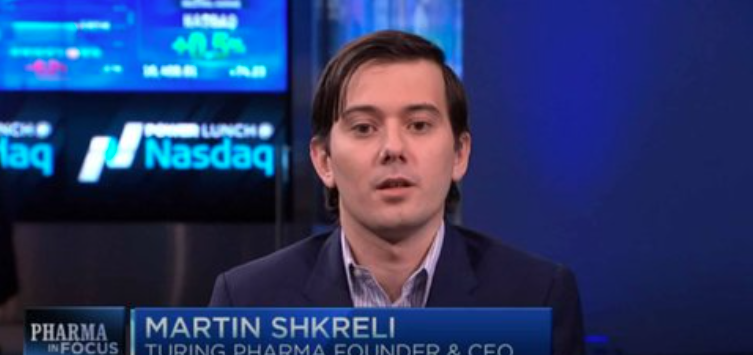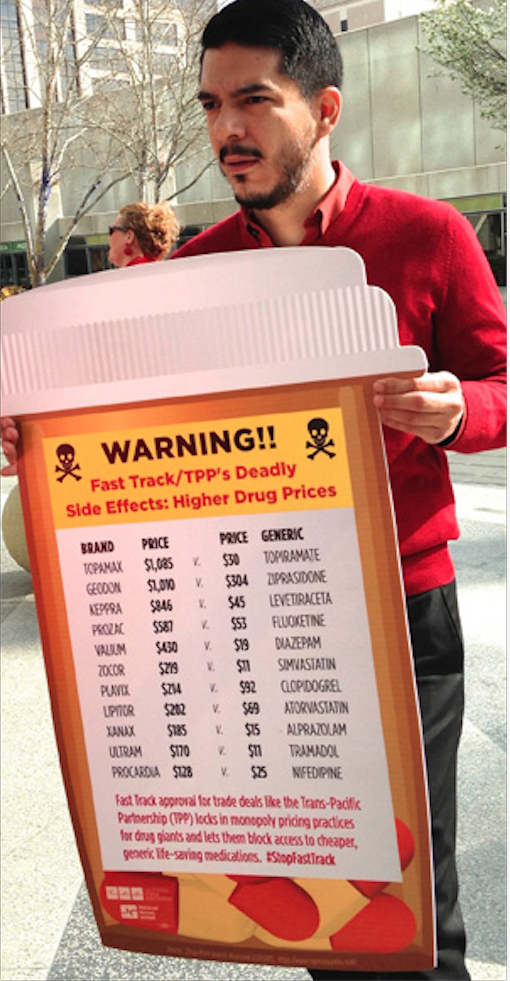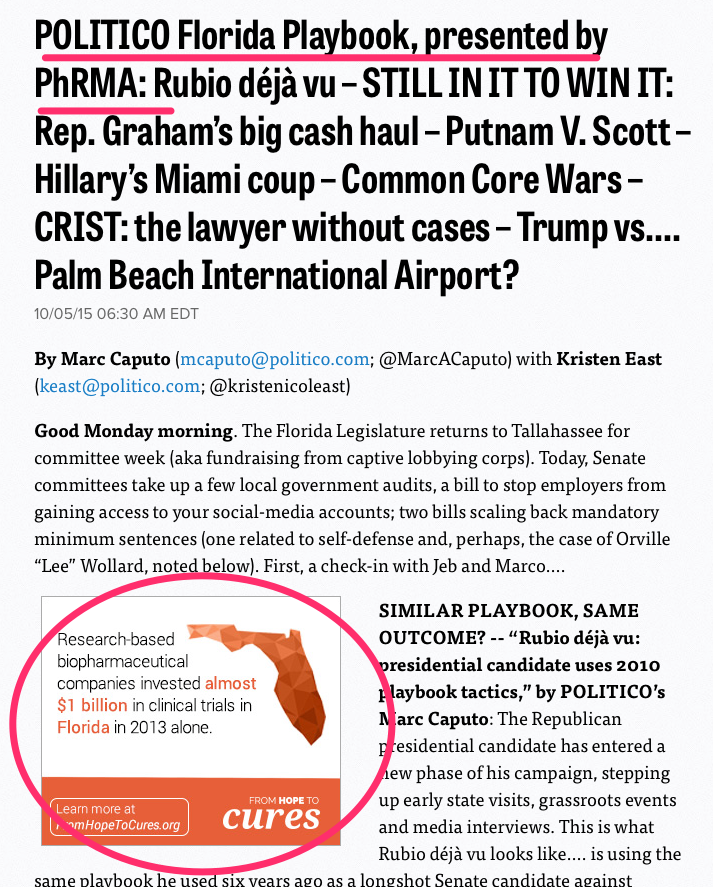Welcome to DU!
The truly grassroots left-of-center political community where regular people, not algorithms, drive the discussions and set the standards.
Join the community:
Create a free account
Support DU (and get rid of ads!):
Become a Star Member
Latest Breaking News
General Discussion
The DU Lounge
All Forums
Issue Forums
Culture Forums
Alliance Forums
Region Forums
Support Forums
Help & Search
General Discussion
Related: Editorials & Other Articles, Issue Forums, Alliance Forums, Region ForumsGeneric drug price gouging brought to you by PhRMA (and POLITICO)

Generic drug price gouging brought to you by PhRMA (and POLITICO)
http://thefloridasqueeze.com/2015/10/07/generic-drug-price-gouging-brought-to-you-by-phrma-and-politico/
By now we’ve all heard about Martin Shkreli, CEO of Turing Pharmaceuticals who bought all the rights to a life-saving drug and jacked up the price more than 5,000 percent. What you probably haven’t heard is that U.S. policy protects price gougers like Shkreli, and with new provisions in the Trans Pacific Partnership, we’re going to see many more generic drugs priced out of reach.
That's right, a 32 year-old MBA can corner the market on a 62 year-old drug that used to cost a buck a pill when it was introduced, and jack it up to $750 a pill making it certain that AIDS patients will die from not being able to afford the medicine, and we can’t do anything about it because the biggest spender in Washington, pharmaceutical lobby is standing in our way.
Sure, there’s some outrage. Both Bernie Sanders and Hillary Clinton have pledged to backfill the mess that forbids the government to negotiate drug prices. Sanders introduced legislation with Rep. Elijah Cummings, called The Prescription Drug Affordability Act of 2015 which authorizes the Secretary of Health and Human Services to negotiate drug prices with pharmaceutical companies to bring down costs for Medicare drug benefits. The bill also bans the practice of brand name drugmakers paying competitors to keep lower-priced generic substitutes off the market, and lowers barriers to the importation of lower-cost drugs from Canada.
But let’s get real. What can truly happen in the short term? It’s an election year and there’s no way we’re getting any meaningful legislation through Congress. That gives these guys all the time in the world to buy up drug patents and make a killing (literally) on medicines that Americans need to stay alive.

How soon before your kid’s asthma medicine is priced out of your reach? Will your SSRI antidepressant be next on the list of leveraged buyouts? Will your mother’s generic blood pressure medicine be next on the auction block? And will she tell you, or will she just stop taking it and you find out when you get “that call” that there was nothing they could do.
People are going to die. It’s that simple.
I’m sick of being told this is a fair price to pay to live in a “free market.” I believe the people who say that are either misinformed, lying or high. As Libertarians in Florida, they’re likely all that (plus goats). No other civilized country allows drug companies to demand whatever ransom they can come up with in exchange for our lives. All other civilized countries recognize the inherent problem with letting private corporations have this much control over the health and well being of a nation. Rather, it's the price we're paying for a corrupt government.
Americans used to have a sense of proportion when it came to such things. When the Sherman Antitrust Act was created in 1890, Senator John Sherman said,
"If we will not endure a king as a political power we should not endure a king over the production, transportation, and sale of any of the necessaries of life."
The Senator was talking about trains and oil. But what could be more necessary than medicine? If we'd fight the appearance of a kingdom with regard to transportation issues, why would we let a lobbying group control medicines that keep our families alive? Why the hell allow a spoiled brat MBA corner the market on relatively ancient, established medicines that have been recognized by the World Health Organization as a model essential medicine?
But what do we expect from a nation that gives control of our healthcare over to our employers? I’ve always said, if people took just one step back and looked at this through the eyes of someone from Australia or Canada, you’d see the inherent problem. To make the well-being of you and your family dependent on your employment status gives entirely too much power to that employer. Sure would be nice to afford that cancer treatment for your child. Guess you'll just have to stick it out in that shitty administrative position with the abusive boss for another few years. Don't even think about negotiating for a fair wage. He knows you can't quit or else your child will die.
You must understand this: these are drugs that have been on the market for decades and are being monopolized for profit. It can happen to any drug. You might pay $4 a month for generic blood pressure medicine, or a cholesterol-lowering statin right now. Or tramadol which enables people function without pain and without narcotic intervention (and is also used in veterinary medicine). In the near future, you might have to pay $30 per pill, or whatever ransom they think they can get away with. People who simply can’t afford their medicine are going to die, and everyone’s health insurance rates are going to skyrocket, as we pick up the tab for this craven pharmaceutical smash-and-grab.
No one is going to stop them either. As I mentioned above, PhRMA is the largest lobbying interest in Washington. And now it seems they’re buying headlines and “journalists” outright.
Check this out:

When I took a peek at POLITICO’s "Florida Playbook" Monday morning and read the headline I thought for sure it was sarcasm or a play on words. Here’s your political news, “presented by PhRMA,” in the headline. Since when are headlines sponsored content? That’s simply not done in respectable publications. Then I saw the matching ad and realized, yep. It’s done in POLITICO World, because it’s not quite news, and it’s not quite journalism and it’s certainly not quite to be taken seriously, precisely because it’s NOT meant as sarcasm. POLITICO absolutely expects you to take it all in, without question, and embrace their lobbyist sponsorship. And lordy no that wouldn’t impact any of their reporting in any way why would you ask such a silly thing, especially given all the recent bad press in the pharmaceutical world?
**"A message from PhRMA" image below is provided from the POLITICO article to show that not only are they framing all their political "news" as sponsored by PhRMA, but they're also providing PhRMA access to their readership in order to prep them to gallantly accept the giant increases in generic drug prices as the cost for research and development. If they really wanted to cure diseases they'd take this money they spend on buying real estate on Marc Caputo's moral compass and roll that into R&D. But don't hold your breath on that one.

InfoView thread info, including edit history
TrashPut this thread in your Trash Can (My DU » Trash Can)
BookmarkAdd this thread to your Bookmarks (My DU » Bookmarks)
3 replies, 540 views
ShareGet links to this post and/or share on social media
AlertAlert this post for a rule violation
PowersThere are no powers you can use on this post
EditCannot edit other people's posts
ReplyReply to this post
EditCannot edit other people's posts
Rec (3)
ReplyReply to this post
3 replies
 = new reply since forum marked as read
Highlight:
NoneDon't highlight anything
5 newestHighlight 5 most recent replies
= new reply since forum marked as read
Highlight:
NoneDon't highlight anything
5 newestHighlight 5 most recent replies
Generic drug price gouging brought to you by PhRMA (and POLITICO) (Original Post)
nashville_brook
Oct 2015
OP
DirkGently
(12,151 posts)1. Do we know yet how the TPP will impact pharmaceuticals?
nashville_brook
(20,958 posts)2. Here's a VOX explainer
http://www.vox.com/2015/10/5/9454511/tpp-cost-medicine
The TPP could also delay cheaper, generic versions of drugs
Meanwhile, every country has systems for granting patents and legal privileges to the first company to invent a drug — a reward for innovation. After these expire, other companies can apply to get their cheaper "generic" copies of these drugs on the market.
At the moment, it's up to countries to decide whether things like a small change in a drug molecule should warrant a patent extension. But the final TPP creates patent-related obligations in countries that never had them before, explained Rius Sanjuan. To put it simply, this would directly target a country's ability to define its own patent law and put a higher standard on when generics can become available.
Critics believe these provisions will likely to limit the availability of cheaper generics. "We know from experience that more expansive patent laws end up reducing the availability of generic medicines," said Yale law professor and global health researcher Amy Kapczynski, who wrote about the deal's health impact in the New England Journal of Medicine. "When you start mucking around in the precise ways countries can define your patent laws," she said, "you limit everyone’s policy flexibility."
The TPP could also delay cheaper, generic versions of drugs
Meanwhile, every country has systems for granting patents and legal privileges to the first company to invent a drug — a reward for innovation. After these expire, other companies can apply to get their cheaper "generic" copies of these drugs on the market.
At the moment, it's up to countries to decide whether things like a small change in a drug molecule should warrant a patent extension. But the final TPP creates patent-related obligations in countries that never had them before, explained Rius Sanjuan. To put it simply, this would directly target a country's ability to define its own patent law and put a higher standard on when generics can become available.
Critics believe these provisions will likely to limit the availability of cheaper generics. "We know from experience that more expansive patent laws end up reducing the availability of generic medicines," said Yale law professor and global health researcher Amy Kapczynski, who wrote about the deal's health impact in the New England Journal of Medicine. "When you start mucking around in the precise ways countries can define your patent laws," she said, "you limit everyone’s policy flexibility."
nashville_brook
(20,958 posts)3. heres a piece from Public Citizen:
http://www.citizen.org/tpp-public-health
The Trans-Pacific Partnership would provide large pharmaceutical firms new rights and powers to increase medicine prices and limit consumers' access to cheaper generic drugs. This would include extensions of monopoly drug patents that would allow drug companies to raise prices for more medicines and even allow monopoly rights over surgical procedures. For people in developing countries involved in the TPP, these rules could be deadly – denying consumers access to HIV/AIDS, tuberculosis and cancer drugs.
The TPP would also establish new rules that could undermine government efforts to contain rising medicine prices in developed countries like the United States. A leaked TPP text could expose taxpayer-funded public health programs to pharmaceutical company attacks and constrain future policy reforms to reduce prescription drug costs for Americans. The text explicitly binds Medicare to TPP rules that would limit proposed policy changes to tamp down healthcare costs for seniors. Continue reading...
The Trans-Pacific Partnership would provide large pharmaceutical firms new rights and powers to increase medicine prices and limit consumers' access to cheaper generic drugs. This would include extensions of monopoly drug patents that would allow drug companies to raise prices for more medicines and even allow monopoly rights over surgical procedures. For people in developing countries involved in the TPP, these rules could be deadly – denying consumers access to HIV/AIDS, tuberculosis and cancer drugs.
The TPP would also establish new rules that could undermine government efforts to contain rising medicine prices in developed countries like the United States. A leaked TPP text could expose taxpayer-funded public health programs to pharmaceutical company attacks and constrain future policy reforms to reduce prescription drug costs for Americans. The text explicitly binds Medicare to TPP rules that would limit proposed policy changes to tamp down healthcare costs for seniors. Continue reading...